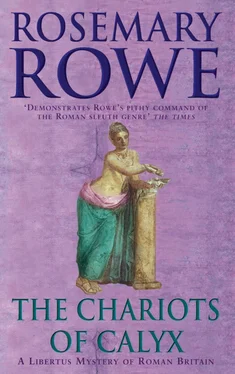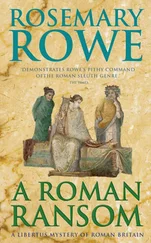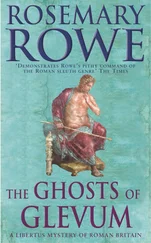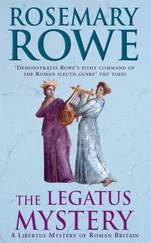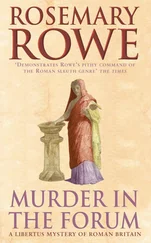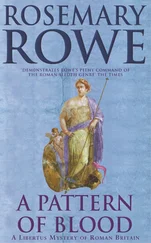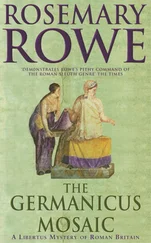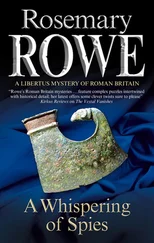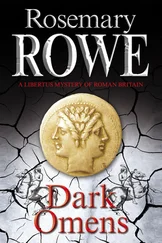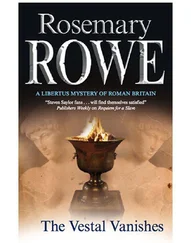Rosemary Rowe - The Chariots of Calyx
Здесь есть возможность читать онлайн «Rosemary Rowe - The Chariots of Calyx» весь текст электронной книги совершенно бесплатно (целиком полную версию без сокращений). В некоторых случаях можно слушать аудио, скачать через торрент в формате fb2 и присутствует краткое содержание. Год выпуска: 2002, ISBN: 2002, Издательство: Headline, Жанр: Исторический детектив, на английском языке. Описание произведения, (предисловие) а так же отзывы посетителей доступны на портале библиотеки ЛибКат.
- Название:The Chariots of Calyx
- Автор:
- Издательство:Headline
- Жанр:
- Год:2002
- ISBN:9781472205087
- Рейтинг книги:5 / 5. Голосов: 1
-
Избранное:Добавить в избранное
- Отзывы:
-
Ваша оценка:
- 100
- 1
- 2
- 3
- 4
- 5
The Chariots of Calyx: краткое содержание, описание и аннотация
Предлагаем к чтению аннотацию, описание, краткое содержание или предисловие (зависит от того, что написал сам автор книги «The Chariots of Calyx»). Если вы не нашли необходимую информацию о книге — напишите в комментариях, мы постараемся отыскать её.
The Chariots of Calyx — читать онлайн бесплатно полную книгу (весь текст) целиком
Ниже представлен текст книги, разбитый по страницам. Система сохранения места последней прочитанной страницы, позволяет с удобством читать онлайн бесплатно книгу «The Chariots of Calyx», без необходимости каждый раз заново искать на чём Вы остановились. Поставьте закладку, и сможете в любой момент перейти на страницу, на которой закончили чтение.
Интервал:
Закладка:
‘It’s said to be the biggest basilica in the Empire, outside Rome,’ Superbus informed us, as loftily as his heavy breathing would allow. Despite his scarlet cheeks he managed to sound as if the glories of the city were to his personal credit.
‘Imagine!’ I gave him a cheerful smile, hanging on to my chair with both hands as my bearers navigated a pile of turnips spread out for sale on the pavement. ‘Hard to believe that less than two hundred years ago there was nothing here but a swamp.’
Unkind, perhaps, although it was nothing less than the truth. Everyone knew that the Romans had built their elaborate city on virgin land. None of our Celtic tribes had ever bothered with the place — the lowest practical crossing of the river, certainly, but the soil for miles around was too poor to support farming. Superbus, however, saw any comment on the city as a blow to his own self-esteem, and he deflated like a punctured pig’s bladder. His face became more scarlet than ever and he said nothing further until we had arrived at our destination.
This proved to be a substantial mansion in the north-east of the city, the door already hung with a wreath of funerary green. It was a large house in possession of a privately walled rear garden with — as far as I could tell from a glimpse over the high wall — a long, low addition on one side. The ‘wing’ in which the fearsome Annia lived, I guessed. After Pertinax’s description, I was looking forward to meeting her.
I had not long to wait. I had hardly set foot to paving before a small, stout woman with folded lips and greying hair had brushed aside the doorkeeper and was waiting in the corridor to greet me. From her wine-coloured stola and imperious air, and the pair of maidservants skulking nervously behind her, this was clearly a lady of some account.
I was surprised to find her there, since I am not a person of particular importance. It is not at all customary for a householder, particularly a female one, to come hurrying out personally in this fashion. Usually the visitor drums his heels in the atrium first, nibbling at dates, while a slave goes through the pretence of summoning the master — or mistress — who will arrive only after a dignified interval. One expects these conventions.
‘Lady. .’ I stopped, lowering my eyes respectfully. ‘The citizen Libertus, at your command.’
If I had supposed, even vaguely, that her unexpectedly prompt appearance was due to womanly anxiety and grief for her dead son, her first words were enough to disabuse me. ‘Well, citizen, so there you are at last. Oh, get up, get up — we’ll have none of that time-consuming nonsense here.’ I had attempted to kneel before her with bowed head, a conventional gesture of respect towards a Roman matron in mourning. ‘There’s work to be done. That female has conspired to have my son done away with, and I want you to prove it. It may not be easy. They are clever, she and that lover of hers. That’s why I sent to Pertinax. I said I wanted the best.’ She inspected me, discontentedly, like a cook at the market appraising a fowl and finding it tough and scrawny. ‘And he sent you. Are you the best?’ I half expected her to reach out and test the flesh on my forearm.
‘I will do my best,’ I said, foolishly, still startled by the nature of my welcome. We had not moved from the entrance-way, and Annia Augusta — if that was indeed who it was — was still standing before me with folded arms, as forbidding as the Nubians at the palace. ‘To find out who is guilty, that is.’
‘It is not a question of finding out who’s guilty,’ she said sharply. ‘Fulvia Honoria, my daughter-in-law, and that wretched Lividius Fortunatus of hers — they are the ones who are guilty. Any idiot could guess that. Proving it will be the problem. That is why I sent for you. What do you say to that?’
I had nothing to say to it. I was too taken aback to make any sensible reply. After a death, especially a violent death like this, one expects emotion — shock at least, or grief — and most of all from the mother. There was no sign in Annia Augusta of anything except scarcely concealed impatience.
She was looking at me pityingly now. ‘It seems you’re not as sharp-witted as I was led to believe. Well, since the governor has sent you, I suppose you had better come in. Come on — all of you!’ She made a sharp gesture with her hand, then turned and led the way into the atrium. We followed her like a flock of docile sheep — her attendants, myself, Junio and Superbus, who by this time was smirking all over his face at my discomfiture.
I tried to ignore him, and concentrated on my surroundings.
The atrium was as tall, classic and gracious as Annia Augusta was not. It was roofed, as most atria are in this most northerly of the provinces, but someone had added an ornamental pool, in imitation of the Roman fashion, with a central statue, a few scattered plants and one or two lethargic fish lurking in it. I wondered what Herculean efforts by the servants were required to keep that little feature constantly cleaned and replenished.
The walls were of painted plaster, depicting hunting scenes, and the room had been elaborately furnished with more expense than taste. On one wall a huge and heavy gold-crusted table groaned under a pot-bellied onyx vase; on another a gigantic marble statue of Vesta squinted down at us from her plinth in a painted niche; and the whole floor boasted an elaborate mosaic, depicting lumpish nymphs and sea creatures in an intricate design of quite exceptional ugliness. What caught my attention, however, was a small plain table in a corner of the open tablinium beyond, on to which a young page was carefully placing a tray containing a selection of fresh fruits and a jug of watered wine.
Annia Augusta glowered at him. ‘What are you doing here?’
The boy stopped, platter in hand. ‘The mistress,’ he ventured. ‘She bade me. . for our guest. .’
To my surprise, Annia seemed to accept this, although ungraciously. ‘Oh, very well,’ she said impatiently. ‘Put it on the table and leave it there.’ The boy did as he was ordered, and escaped from the room with evident relief.
‘My daughter-in-law,’ Annia said. ‘Giving herself airs.’ She smirked — a little smile of satisfaction. ‘Well, let her wait until the will is read. That will put a stop to her tricks. Filius will be the heir, and we shall see who is the mistress then.’ She turned to me with a tight little smile and gestured to the plate. ‘Though I suppose you may have some of this if you desire, now that it has been prepared. I don’t like to see good food wasted. I would have offered you refreshment myself, if I thought you wanted it. But you have come from the governor’s palace. No doubt you are already fed and watered satisfactorily?’
This was so outright discourteous that for the first time since I had entered the house and encountered this extraordinary woman I abandoned all attempts at the delicacy one normally displays in the face of sudden loss. I squared my shoulders and tried to look as masterful as I could.
‘Madam citizen,’ I said, with punctilious courtesy, ‘I shall be grateful to accept your hospitality.’ She was right, of course: I was neither hungry nor thirsty, but I felt that if I did not take a stand, and soon, I would lose my precarious authority altogether, governor’s protégé or not.
Annia Augusta looked affronted at my words — I guessed she was not often defied by anyone — but she signed to one of her maidservants to fetch a stool, while the other led Junio and Superbus off to wait in the servants’ room, as the custom was.
‘And while I am enjoying your generous welcome,’ I added, following up my earlier social swordplay with a calculated thrust, ‘you mentioned a number of names. Perhaps you could explain to me who these people are?’
Читать дальшеИнтервал:
Закладка:
Похожие книги на «The Chariots of Calyx»
Представляем Вашему вниманию похожие книги на «The Chariots of Calyx» списком для выбора. Мы отобрали схожую по названию и смыслу литературу в надежде предоставить читателям больше вариантов отыскать новые, интересные, ещё непрочитанные произведения.
Обсуждение, отзывы о книге «The Chariots of Calyx» и просто собственные мнения читателей. Оставьте ваши комментарии, напишите, что Вы думаете о произведении, его смысле или главных героях. Укажите что конкретно понравилось, а что нет, и почему Вы так считаете.
